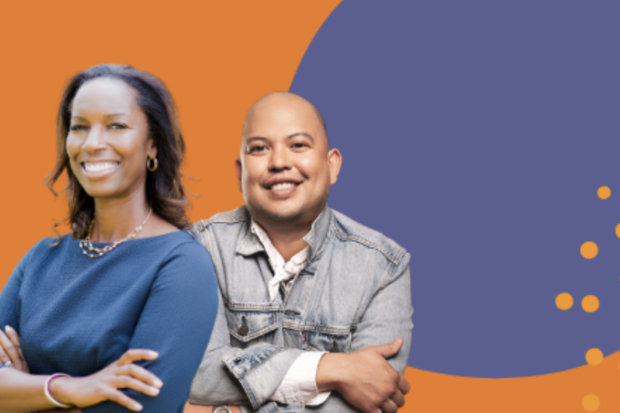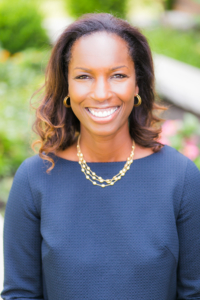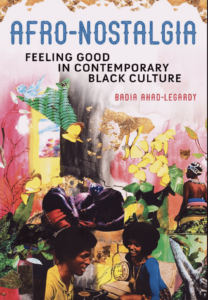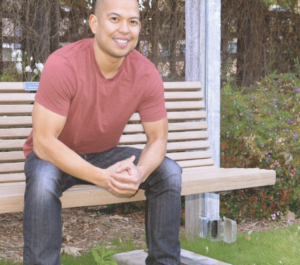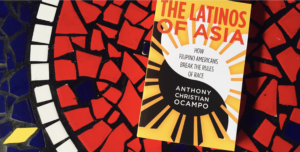Recently, we were lucky enough to interview Badia Ahad-Legardy, PhD and Anthony Ocampo, PhD. We covered a variety of topics: their respective work in academia, perspectives on diversity in higher education and collaboration on the “Professor-ing” podcast.
In addition to their “day jobs,” these two professors worked with the National Center for Faculty Development & Diversity. The NCFDD offers many resources for higher education institutions and career advice and work/life balance for academics at all stages.
You’ll definitely want to listen to their tell-it-like-it-is banter in the podcast, where “they share the R&R — the real and real-er about life in academia.”
Related: National Center for Faculty Development & Diversity
Badia Ahad-Legardy, PhD: Background and Books
Badia Ahad-Legardy is a Professor and Vice Provost of Faculty Affairs at Loyola University Chicago.
In addition to her many roles on campus and with the NCFDD, Dr. Ahad-Legardy is a scholar of contemporary African American literature and culture.
Her research and books examine affective sentiments that are generally overlooked with respect to the inner lives of African Americans (leisure, nostalgia, love).
“My research sits at the intersection of African American literature and culture and psychological studies, with a specific focus on black interiority (feelings, emotions, moods).
I am the author of two books, Freud Upside Down: African American Literature and Psychoanalytic Culture and Afro-Nostalgia: Feeling Good in Contemporary Black Culture, and co-editor of Difficult Subjects: Teaching Race, Sexuality and Gender.”
Anthony Ocampo, PhD: Background and Books
Anthony Ocampo, PhD is a scholar and writer who focuses on race, immigration, and LGBTQ issues. He is Assistant Professor of Sociology at Cal Poly Pomona and a Ford Foundation Fellow.
He is also the author of The Latinos of Asia: How Filipino Americans Break the Rules of Race, shown here and recently featured on NPR Morning Edition.
Dr. Ocampo is currently working on his second book, To Be Brown and Gay in LA, which chronicles the lives of gay men of color from immigrant families.
A native Los Angelino, Dr. Ocampo is a graduate of Stanford University (BA 2003, MA 2004) and UCLA (MA 2006, PhD 2011).
“Professoring” Podcast: The Idea

Badia has a long commute to work and is a self-described “podcast junkie.” She had been interested in doing a podcast herself for years. At the time, she was the director of training for National Center for Faculty Development & Diversity (NCFDD) and was mulling over the best ways to deliver content to faculty.
The primary way this was being done was webinars using a very formal slide show format, which struck her as very “professorial.” She thought it would be more engaging and inclusive to have another way to deliver this content, “a more conversational way to interact with the audience.”
On the other hand, Anthony doesn’t have a long commute. He does have a lot of experience figuring out alternate channels to disseminate academic knowledge and content. He’s worked with Twitter, Instagram and podcasts to communicate content. He likes that these types of channels allow people more storytelling opportunities and an easy way to make the stories more appealing by including some of the quirkiness and personality of the storytellers themselves.
“Professor-ing” Podcast: Logistics & Season 1 Topics
Both Anthony and Badia mentioned that it took time to make the podcast happen, and they weren’t exactly sure how it would turn out. But they knew the “two of them could talk about all the things people [in academia] want to talk about but don’t.”
Topics in Season 1 range from knowing when it’s time to break up with a collaborator, how to deal with “professor-ing” when major life events happen, the challenges of writing that second book and falling in love with reading.
A theme in the 6-podcast series is that often, in academic spaces, people’s experiences of being queer or a person of color come out only as trauma. As Anthony says, being on the NCFDD platform opened up the option of sharing “the ‘traumedy’ and joy of being queer or person of color, even in academic spaces,” not just the painful parts of those experiences.
Related: Professor-ing Podcast Season 1
“Professor-ing” Podcast: Season 2 and Beyond
Anthony will be helming Season 2 of “Professor-ing” with a new co-host (to be announced) since Badia has taken on a new role of Vice Provost for Faculty Affairs at Loyola University Chicago and is “too busy navigating institutional change around here!”
Season 1 was recorded prior to the pandemic, so one challenge for Season 2 of “Professor-ing” is to acknowledge the effects of COVID while still delivering on the original theme of the reality of academic life. And in many cases, COVID-19 has exacerbated the experiences of people of color, whether they’re in academia or not.
Anthony mentioned some of the key topics for the next season of “Professor-ing” are “an obligatory COVID-19 debrief, relationships (a reckoning of what that looks like at this stage of life), and staying alive in academia.”
Season 2 episodes are coming soon, so we have something to look forward to when they are released!
Discussion on Academic Life and Diversity in Higher Education
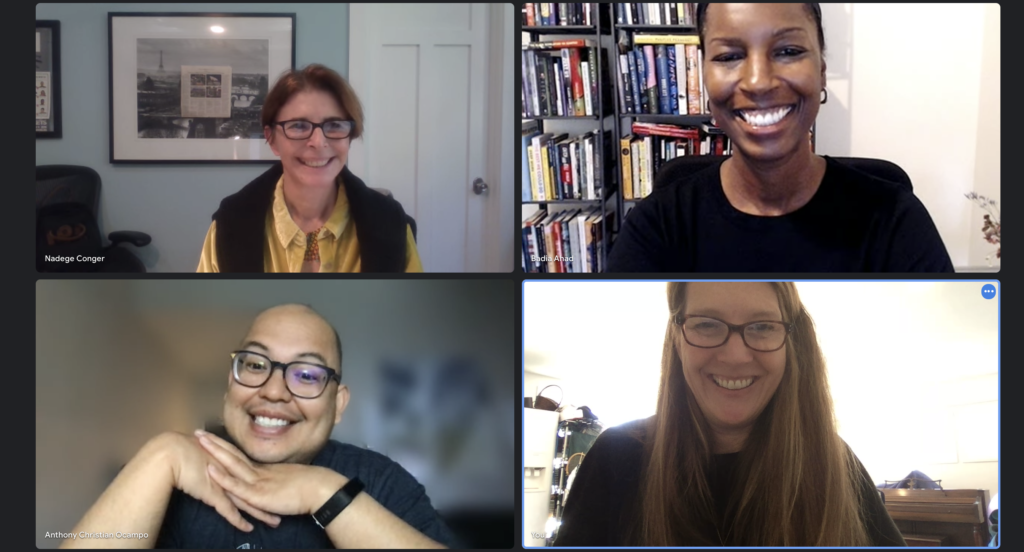
One of the silver linings of the pandemic is the expanded uses of video meetings. It is always nice to have a face-to-face connection with people we are interviewing, even if it is sometimes through our computers!
On a more serious note, we wanted to hear from Anthony and Badia about their perspectives and experiences with diversity in higher education. When we asked what they have seen change and where changes are still needed, the answers were clear.
Real Policy Changes versus Superficial “Color” Changes
To put it simply, Anthony asked “why are the stories the same [in 2021] as in 2013?” The stories he’s referring to are the experiences of being socially isolated and undermined, especially for women of color. He wondered out loud, “to what extent ‘diversity’ is cosmetic; has it moved beyond a ‘United Colors of Benneton’ advertising campaign? If the goal is to get the structure beyond white and male, have we done that?”
Badia pointed out that “there’s a distinction between diversity being an inherent good, but it doesn’t do much to get a bunch of raced people in the door [if the institution] doesn’t value what they’re saying, treating [people] with respect, being able to engage with students in ways that are transformative. The real thing is to make real change on policy. Even if you have diversity in leadership, if the policies are the same it has the same effect – persistence of structural rascism.”
Implementing Diversity Policy Change
When Nadege asked for examples of policy and practices that would need to change, many of both professors’ answers had to do with what Anthony stated as “what counts as knowledge.”
Badia mentioned the way people talk about “fit” for candidates when hiring and interviewing. For example, if an English department were hiring for someone who specializes in African Literature, others in the department might ask the candidate questions like, “How does your work relate to Whitman or Chaucer?” implying a refusal to acknowledge their work in African Literature on its own terms. To put it in other terms, it’s a way of judging a person’s scholarship by its proximity to white, male Western literature.
Similarly, if you look at the required number of courses in many honors programs, how many courses do students have to take in different areas? There may be multiple required classes in a category like Renaissance literature but only one required course in a combined grouping of literature that might include African-American, Asian-American, Mexican-American literature and more.
As a sociologist, Anthony pointed out that sociologists claim to be experts in inequality, but top departments often don’t even talk about inequality in their own ranks. He quoted Henry Lewis Gates, Jr.:
“Intellectuals…can be defined as experts in legitimation. And the academy, today, is an institution of legitimation—establishing what counts as knowledge, what counts as culture.”
Recognizing when Universities Get it Right
In the spirit of fairness, Anthony pointed out that some schools, including his school, Cal Poly Pomona, are taking steps to improve.
Systemwide, the 23-campus California State University system now mandates an ethnic studies course for all students as a graduation requirement. While this benefits the student body in terms of exposure to subjects they might not take otherwise, it also creates more positions in that these schools have to hire additional faculty qualified to teach those courses.
While he is supportive of these changes, Anthony also points out that many initiatives for diversity are driven unnecessarily by tragedies. “It shouldn’t have taken George Floyd, shouldn’t have taken Asian American women being killed in Atlanta” to drive change.
One recent change Anthony’s department has made is to expand the scope of what counts as research to include scholarship beyond journal articles, including op-eds, newspaper articles, and the like. This was a change driven by Anthony’s chair, Dr. Anjana Narayan. A key difference that helps faculty who are teaching a heavy load of classes is that now being published is not limited to “the right journal.” Less traditional options like writing for a news outlet, podcast or curating museum are now accepted as well.
Related: California State University Task Force on the Advancement of Ethnic Studies
Designing Courses Based on Student Responses
In her new role as Vice Provost, Badia is in a position to influence the mix of courses offered at her university. She mentioned the idea in academia, especially in English departments, of the “crisis of humanities,” with no one taking what are seen as “older” classes anymore. In her experience, maybe it’s not a crisis so much as a need to revise available classes.
In her previous role as a professor before becoming a Vice Provost, Badia taught African-American literature. One question she would always ask students was, “Why are you taking this course?” Invariably their response would be something along the lines of “because I’m tired of learning about Shakespeare!” Her perspective is that many students want to be exposed to the broader range of knowledge, and it’s up to our universities to provide that.
Anthony pointed out the irony that he has never taught a Filipino studies class and wonders why a course on Filipinos couldn’t be part of the “mainstream” curriculum. By creating courses that reflect what students are interested in, it will even out the balance between the traditional “classic” courses in the humanities and evolve towards a more well-rounded education that allows for multiple experiences.
Crisis averted.
State of Sabbaticals
Sabbaticals, taking leave from your day-to-day work for research or for pleasure travel – all of these are close to our hearts at SabbaticalHomes.com, which is probably obvious! We asked Badia and Anthony about their experiences with sabbaticals and what they each think sabbaticals will look like in the future.
Taking a Traditional Sabbatical
As Anthony sees it, the challenge of how much time you’re able to take for a sabbatical is dependent on the compensation involved at your institution. In the California State University system, an eligible tenured professor could take a sabbatical for 1 quarter at full pay, 2 quarters at 75% pay or the whole year at 50% pay. (They are now on a semester system, and so they are allowed to take one semester at full pay, and the whole year at 50% pay). People who have other sources of income are able to take longer sabbaticals, but many cannot afford that.
He also knows that people’s sabbatical options can be limited by their caregiving roles, whether for children or someone else in their lives. Women especially tend to absorb caregiving duties, which can eat into time “away.”
In Anthony’s own experience, he’s taken both a one semester sabbatical and a full year, although the full year was more like a post-doc year. He’s found that if you take off one term (whether quarter or semester), you almost don’t get into the headspace until the sabbatical is over. For much of the first part of the time off, you’re still figuring out “the shift in your energy and dealing with the exhaustion and emotions” that catch up to you when you have time off. This can also be difficult, since in his case, he needed to write a book. He was so anchored in the task at hand that he didn’t really have the opportunity to rest, which is part of the point (and the meaning of the word “sabbatical”)!
For his one year off, he “embarked on a bunch of different creative projects and was able try different versions [of himself] as an academic. It was inspiring to plant the seeds of creativity” that continued to serve him well after the time off.
Badia was able to take a couple of sabbaticals earlier in her career. She used them to write, as she “personally finds writing a treat, but spent most of [the time] working.” She didn’t have the luxury of traveling at that point in her life, as, in her own words, “she was too broke!” And, as life happens, she married and inherited two lovely children. It became too hard to be away for long stretches.
Related: 5 Simple Steps to Get Started with SabbaticalHomes.com
Thank you to Badia & Anthony
We are thankful for the behind-the-scenes tour on the inception and evolution of the “Professor-ing” podcast sponsored by the National Center for Faculty Development & Diversity. The podcast is definitely an enjoyable way to spend your time; once you hear it, you’ll be looking forward to Season 2 like we are!
It is incredibly valuable to hear insights on the state of diversity in higher education from academics like Badia and Anthony. Their pulse on what is real improvement versus lip service offer a sincere approach to increasing true diversity on campuses.
Finally, because sabbaticals are at the heart of what we focus on, and because they are essential to reflection, relaxation (if you are lucky) and rebooting our member’s lives and institutions, we enjoyed finding out about our interviewees’ own sabbatical experiences.
We love to meet and share stories of academics in our community. Please contact us if you know someone who is doing something extraordinary! Let us know what you think; Connect with us on Twitter, LinkedIn, Facebook, Instagram, YouTube and Pinterest.


